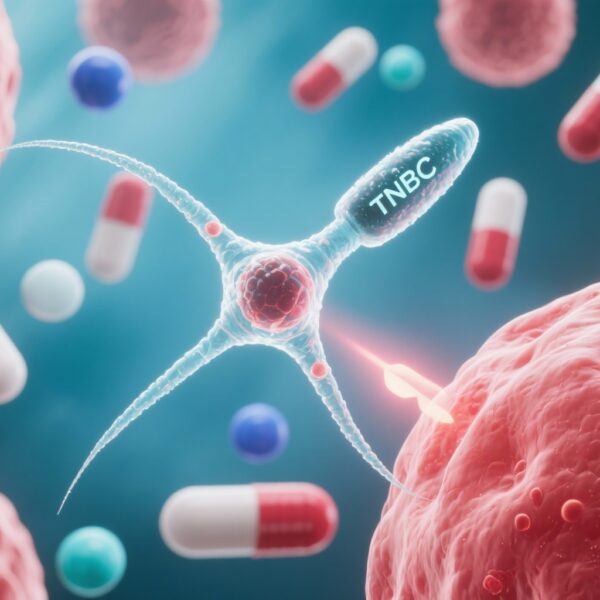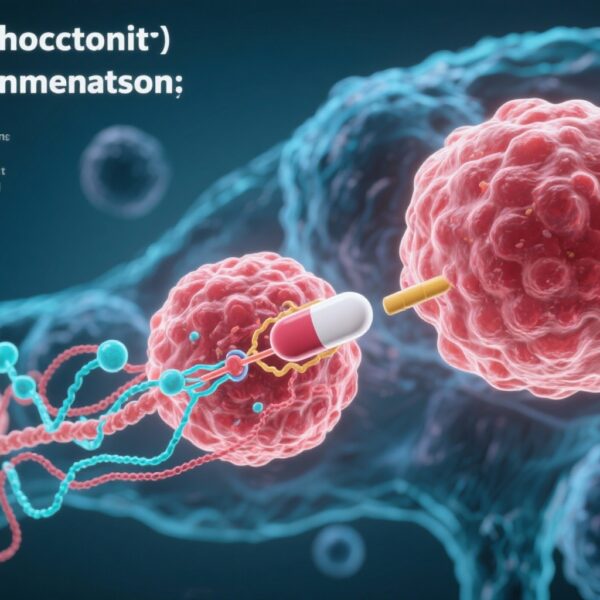Introduction
Non-small-cell lung cancer (NSCLC) remains the leading cause of cancer-related mortality worldwide, with a significant subset harboring mutations in the epidermal growth factor receptor (EGFR). Although targeted therapies such as EGFR tyrosine kinase inhibitors (TKIs) have markedly improved outcomes, resistance invariably develops, leaving patients with limited options. Recent advancements focus on novel therapeutics capable of overcoming resistance mechanisms. One such promising agent is sacituzumab tirumotecan (sac-TMT), an antibody-drug conjugate targeting trophoblast cell-surface antigen 2 (Trop-2), conjugated with a potent topoisomerase I inhibitor. The recent phase 3 trial by Fang et al., published in the New England Journal of Medicine, provides compelling evidence for its efficacy in EGFR-mutated NSCLC resistant to TKIs, marking a potential paradigm shift in management of this challenging subset.
Clinical Background and Unmet Need
Patients with EGFR-mutated NSCLC initially respond well to EGFR-TKIs; however, most eventually develop resistance, leading to disease progression. Options after TKI failure remain limited, typically involving platinum-based chemotherapy with modest survival benefits and substantial toxicity. Moreover, current therapies lack specificity for resistant clones, underscoring the need for targeted agents that can effectively address resistance mechanisms, improve survival, and maintain quality of life.
Study Design and Methods
The trial was a randomized, open-label, phase 3 trial enrolling 376 patients with EGFR-mutated, locally advanced or metastatic nonsquamous NSCLC who had experienced progression after EGFR-TKI therapy. Participants were randomly assigned in a 1:1 ratio to receive either sacituzumab tirumotecan monotherapy or a standard platinum-based chemotherapy regimen with pemetrexed. The primary endpoint was progression-free survival (PFS) as assessed by blinded independent review, with overall survival (OS) predefined as a secondary endpoint. The trial employed rigorous stratification and survival analysis to ensure robustness of results, with interim analysis confirming statistical significance for PFS.
Key Findings and Results
At a median follow-up of 18.9 months, the median PFS was significantly longer in the sac-TMT arm at 8.3 months compared to 4.3 months for chemotherapy (hazard ratio [HR], 0.49; 95% confidence interval [CI], 0.39 to 0.62). The most compelling outcome was observed in overall survival; patients receiving sac-TMT had a median OS of significantly longer at the time of analysis, with a hazard ratio for death of 0.60 (95% CI, 0.44 to 0.82; P=0.001). The 18-month OS rate was 65.8% for sac-TMT versus 48.0% for chemotherapy. Safety profiles revealed grade 3 or higher adverse events in 58.0% of sac-TMT recipients, primarily neutropenia (39.9%), while serious adverse events occurred less frequently with sac-TMT (9.0%) compared to chemotherapy (17.6%). Notably, treatment-related discontinuation due to adverse events was low, indicating a manageable safety profile.
Discussion and Expert Insights
This trial underscores the potential of sacituzumab tirumotecan to serve as a targeted therapy overcoming resistance in EGFR-mutated NSCLC. The significant improvements in PFS and OS suggest that Trop-2 targeting may provide a new therapeutic avenue, especially for patients with limited options following TKI failure. Expert commentary highlights that such antibody-drug conjugates can leverage specific tumor antigen expression for precise delivery of cytotoxic agents, potentially reducing off-target toxicity. Limitations include the need for confirmation in broader, real-world populations and evaluation of long-term adverse effects. Future research should explore resistance mechanisms, combination strategies, and biomarkers predictive of response, to refine patient selection and optimize outcomes.
Conclusions and Clinical Implications
The phase 3 trial demonstrates that sacituzumab tirumotecan offers superior survival benefits over traditional chemotherapy in EGFR-mutated NSCLC resistant to TKIs, with manageable toxicity. These findings highlight a promising precision medicine approach, addressing a critical unmet need in resistant NSCLC. Clinicians should consider this novel therapy in appropriate patient subsets, pending regulatory approvals and further validation. As research progresses, targeted antibody-drug conjugates like sac-TMT may redefine the therapeutic landscape for resistant lung cancers, emphasizing the importance of integrating novel targeted agents into clinical practice.
Funding and Trial Registration
This study was funded by Sichuan Kelun-Biotech Biopharmaceutical. The trial is registered at ClinicalTrials.gov (NCT05870319).
},



